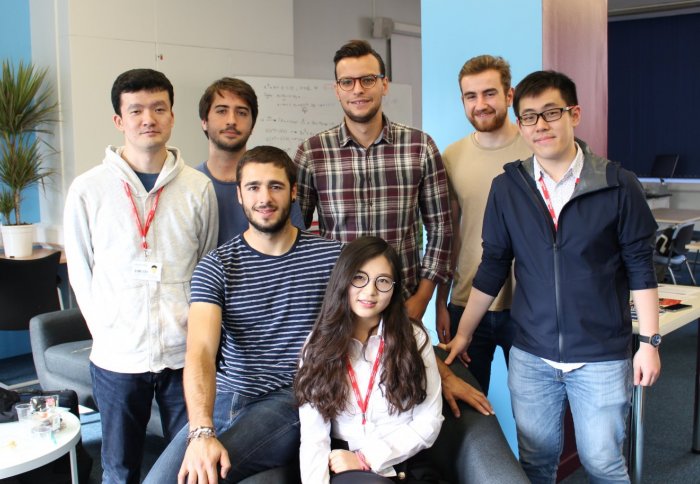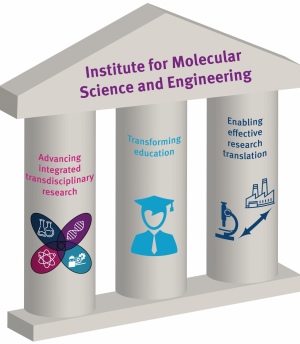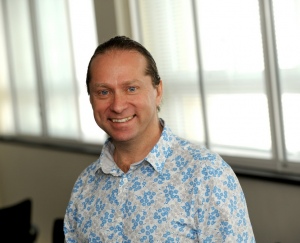Creating a new generation of 'multilingual' engineers and scientists

IMSE MRes Students
A unique Master's of Research in Molecular Science and Engineering was recently launched by the Institute for Molecular Science and Engineering.
The first cohort of seven students has now successfully completed their first term of study, and they will soon embark on their research placements at industrial partners in the UK and abroad.
Molecular science and engineering
It is fascinating to me, that by predicting and controlling matter at the molecular (microscopic) level, it is possible to determine and engineer the best solutions to specific problems at a macroscopic level.
– Mr Xabier Jimenez Garcia
IMSE MRes Student
At the Institute for Molecular Science and Engineering (IMSE), we don’t see the benefit of the boundaries that tend to separate traditional academic disciplines. Instead – in keeping with a ‘convergence’ mind-set – we believe that bringing together a multifaceted array of well-trained people from a variety of backgrounds is the most efficient way to tackle important societal problems.
Indeed, the concept of ‘molecular science and engineering’ – melding a deep understanding of molecular science with an engineering perspective – is gaining popularity around the world as a powerful approach for creating new, effective and sustainable solutions to grand challenges.
Transforming education
I was particularly drawn to this MRes programme because of the chance to gain industrial insights, and to see how my future research may have both practical applications and a meaningful impact in society.
– Mr Konstantinos Zinelis
IMSE MRes Student
Despite this popularity, there are a number of obstacles that prevent the full potential of the molecular science and engineering concept from being realised. For example, “there is a growing need within industrial settings for graduates who have expertise that spans the breadth of science and engineering” explains IMSE MRes Programme Director Professor George Jackson. To help them tackle the problems they face, companies are keen to employ skilled, ‘multilingual’ scientists and engineers who can work together seamlessly at the interface of molecular science and engineering.
Transforming education in the field of molecular science and engineering is therefore one of the three guiding pillars upon which IMSE was founded. The Master's of Research (MRes) in Molecular Science and Engineering has been specifically designed to equip graduates with an unparalleled transdisciplinary perspective, as well as a set of fundamental and applied skills that will serve them well in their future careers.

IMSE guiding pillars
In particular, collaborative abilities will be enhanced through a six-month translation-focused research project that is conducted partly at Imperial and partly at an industrial partner. This year, the seven MRes students will each be undertaking a bespoke project at one of four industrial partners: BASF (Germany), Procter & Gamble (USA and Belgium), Process Systems Enterprise (UK) and STFC Hartree Centre (UK).
World-class training
The 2017–18 cohort of IMSE MRes students come to Imperial from all over the world (China, Japan, Greece, Spain, Indonesia and the UK) and with a variety of previous experience, having undergraduate degrees in chemistry, chemical engineering and biomedical engineering. This diversity means that the students benefit from reciprocal peer-to-peer learning, as well as from the formal teaching provided by Imperial staff.

Professor George Jackson
The MRes is designed to provide students with an in-depth understanding of the multiple scales involved in molecular science engineering – from molecular interactions through to whole manufacturing systems. During the first term, a set of introductory modules – covering the underpinning scientific principles of molecular science and the fundamentals of molecular engineering – helps to bring all students to the same academic level.
Following this, the more-advanced ‘core’ modules are delivered: designing molecular systems for sustainability; manufacturing processes; multiscale modelling (understanding, visualising and predicting); measuring (analysis and characterisation); and making (synthesis for device manufacture).
Working with my fellow students from different backgrounds, and gaining a new engineering perspective in my education have been the highlights so far.
– Ms Hanwen Zhang
IMSE MRes Student
Through these courses, the IMSE MRes students receive world-class teaching by many Imperial researchers. Spearheaded by Professor Jackson, the teaching staff currently features 26 academics from 7 Imperial departments (in the Faculty of Engineering and Faculty of Natural Sciences), including Professor Claire Adjiman (IMSE Co-Director), Dr Niall Mac Dowell, and Dr Jason Hallett.
Having now completed these core modules, the seven IMSE students are about to head off to begin their research placements at their industrial partners. The students will spend between one and three months working on these projects on site at the industrial sponsors, before returning to Imperial to continue their collaborative research with two academics (from two different departments). Ultimately, each student will write up their research project in the form of a research article and they will present their work at the IMSE MRes Symposium in July.
Impressions and plans
After their first term on the MRes, the students have enjoyed the challenge, and breadth, of the lectures and coursework. Most of the group are new to Imperial and London, and are very impressed by the huge number of extracurricular opportunities on offer in the city, and in College itself. All seven students are now very excited to start their industrial placements. Indeed, this was the most appealing aspect of the programme for most of the students (which distinguishes it from many other Master’s courses).

IMSE students with Mr Tony Meredith during a demonstration of 3D printing (Credit: Joao Cabral)
Looking ahead, the students hope the MRes will equip them for a range of future careers. Several of the students hope to pursue PhD research upon completion of the course, whereas others would prefer to move into an industrial setting. For example, Victor Thamrin wants to “work on increasing sustainability in the fast-moving consumer goods sector”, and Masahiro Takenaga will return to his work at Canon in Japan where he will develop novel products for the company.
Applications for 2018 entry
Applications for 2018 entry to the course are now open, with the first round of interviews scheduled for February. Please contact Hannah Davy with any questions.
Article text (excluding photos or graphics) © Imperial College London.
Photos and graphics subject to third party copyright used with permission or © Imperial College London.
Reporter
Dr Shoshana Z Weider
Faculty of Engineering